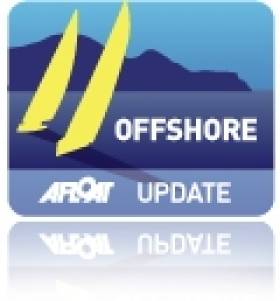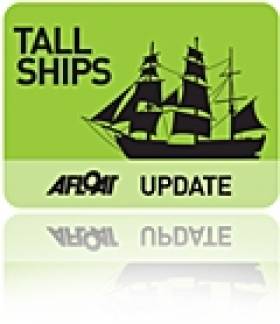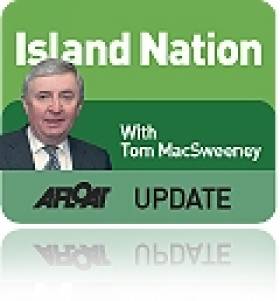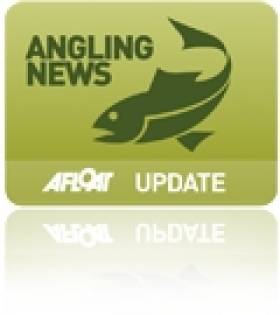Displaying items by tag: School
Irish Offshore Sailing Makes Success of Debut Season
Irish Offshore Sailing, a new yacht training centre based in Dun Laoghaire, Co. Dublin is now launching its autumn winter calendar, having had a very busy first season, despite the current economic climate.
The school is an RYA and ISA recognised yacht training centre and was set up by Corkman Rónán Ó Siochrú in January 2011. The school runs liveaboard sailing courses onboard a 2002 Jeanneau Sunfast 37 called "Desert Star".
Sailing school Principal, Ronan O Siochru attributes much of the schools success to date to holding onto a set of core values throughout each course: A commitment to professional, affordable sail training in a 'warm friendly Irish atmosphere'. "We have come into the market under no illusion as to the difficulties in the tourism and leisure sector in a recession, but we have priced our courses in a way that reflects realistically what people can afford to pay for a sailing course.
The most important key to our success, has been a driven campaign to bridge the gap between the large number of people who have never set foot on a sailing boat, and a liveaboard sailing course! We offer evening and afternoon 2 and a half hour sails at €30 per person on the days when the yacht is not working on a practical course. This has worked extremely well for us in getting clients to take that leap of faith in booking onto a weekend liveaboard sailing course, and in spreading the word that we are a new training centre and are here to stay!
I have always had a personal commitment, to help break down this notion that sailing is a sport for the elite, having spent two years living in France, I saw how the French promote sailing in their country in the same way the GAA promote hurling and football."
Irish Offshore Sailing also offer sailing courses through Irish and French. This is a niche in the market and is certainly likely to take off over the coming year. Despite running a few very successful courses, it has had to sit on the back burner this summer, due to the business of the summer season and a lack of time to generate an effective marketing campaign. Irish Offshore Sailing are also looking forward to next season in getting an offshore racing campaign off the ground.
O' Siochru skippered a Sunfast 37 in the Round Ireland Yacht Race to a 23rd place overall with a crew of novice sailors.
When asked, how do you handle skippering a yacht offshore with the kite up in the dark with a bunch of beginner sailors he smiles......" its amazing what yacht crews can do when they just do some training, and iron out problems with each manoeuvre!" "We come across quite a lot of sailors in this country who become so eager to be boat owners that they miss out on that important learning process of being onboard yachts with experienced sailors to learn from. It was amazing even during the boom, how some people could fork out over €100,000 for a yacht and yet, be unwilling to part with €650 to learn how to use it!
The height of the summer season is starting to come to an end, but it looks like Irish Offshore Sailing has become established as a sailing school on the East Coast, with bookings filled into the end of October and over 1,000 hits per month on their website.
"I cannot believe it has worked out so well for us, I sailed Desert Star into Dun Laoghaire on the 22nd of April, maxed out on all credit, without a penny in the bank, but with a lovely yacht ready for work, a good website and a burning ambition to see it succeed...... and I think we have done okay! Most importantly, I've made a job for myself that I like.... I love sailing, I like working outdoors, I love teaching and (despite its headaches) I like working for myself!
West Cork School Offers Temporary Tall Ship Sloop Solution
"There was fantastic energy at the Tall Ships workshop and while it was agreed that Ireland would benefit tremendously from an iconic square rigger tall sihip, this will take some to bring to fruition.
In the meantime, we are can look to existing Tall Ships operating with Irish Flag to offer the great experience that Sail Training can offer. Rohan MacAllister, previously captain of Asgard II for 10 years attended the meeting with Gail & Niall MacAllister of West Cork Sailing Centre to present Cypraea as a marvelous tall ship sailing sloop that is equipped to provide sail training on our Irish waters this summer.
The attendees of the meeting congratulated the MacAllisters on their tenacity and determination in bringing their sail training vessel to our waters and making the "Sail Training Experience" accessable for teenagers and adults this summer by dedicating July to Teenage Sail Training 5 day adventure sails for 350 euro and August to Adults at 450 euro.
Cypraea is a 23.5m steel sloop with berths for 10 at present and plans to increase to 16. She has three sails and is an extremely hands on team work sailing experience.
West Cork Sailing have been providing ISA and RYA sailing for many years and are excited to be providing Sail Training and the amazing life changing opportunity that it can bring".
Looking for further reading on Tall Ships in Ireland? Click the links below:
Click this link to read all our Tall Ships Stories on one handy page
Previewing Ireland's Tall Ships 2011 Season
Can Ireland Get a New Tall Ship?
Conference Hopes to Bin Ocean Debris
It was very topical, because this week the Fifth International Marine Debris Conference is taking place in Hawaii, organised jointly by the National Oceanic and Atmospheric Administration and the United Nations Environment Programme. This is an attempt to deal with the increasing problem of debris in the oceans of the world.
A United Nations report revealed some pretty frightening facts to the conference. Just two kinds of rubbish make up more than half the marine debris in the world. One is predictable enough – the horror of plastic choking sea life. The other came as more of a shock. The second most abundant kind of marine litter is smoking-related. Cigarette butts and packing account for nearly half of all sea rubbish in some parts of the world, according to the UN.
About 40 per cent of the litter in the Mediterranean Sea comes from this source. In Ecuador, smoking-related refuse accounted for more than half of coastal rubbish.
Ocean debris is a severe threat to the marine eco system. It kills at least 1 million sea birds and 100, 000 mammals each year, according to the United States National Oceanic and Atmospheric Association. The general prognosis at the conference in Hawaii has been pretty grim. Things are getting worse and it is the fault of humans on land using the oceans as rubbish dumps.
As my grandson's homework showed, it takes two weeks for a bit of fruit thrown into a river or the sea to bio-degrade. It will be two months before a piece of cardboard breaks down, three months for a milk carton and matters get worse where a cigarette butt is concerned. That will take ten years to disintegrate, a Styrofoam coffee cup 50 years, a plastic bag over a hundred and the six-pack ring so often tossed overboard from boats 400 years, with the plastic bottle even worse at 450 years.
The threat and impact of marine debris have long been ignored. Perhaps it is the perceived vastness of the ocean and lack of visibility of marine debris, but the teachers in Crosshaven national school, on the edge of Cork Harbour deserve praise for making their young pupils aware of what throwing litter into a river or dumping it on a beach does.
• This article is reprinted by permission of the EVENING ECHO newspaper, Cork, where Tom MacSweeney writes maritime columns twice weekly. Evening Echo website: www.eecho.ie
City Powerboat School on the Market
Due to an opportunity for its owners overseas Dublin City's only powerboat training school, City Powerboat School is on the market. The Irish Sailing Association recognised training establishment is advertised in next week's edition of Afloat magazine. The school operates in the 'highly visible' River Liffey area. School principal Felix Finlay says 'the position of the school in Dublin City has attracted many enquiries, for not only powerboat training courses, but sail training, tourism activities, and educational opportunities'. More here.
Sailing School Navigates Beyond the Gloom
The Principal John Moore has discounted all prices by 20 to 30%. All 2009 sailors returned in 2010 and brought friends with them. The French network of the newly appointed Director of Sailing Hugues Traonmilin has brought French families to the island and the French sailors were mixed with the Irish and British children and adults with great success. In addition to a busy summer season, 60 students of a South East College came for the very first time to the Sailing School in March 2010 as part of the Transition Year programme. They were hosted with full board accommodation at the Sailing School Guest house.
Definitely the location of the Sailing School plays a big part in this success story. Heir Island is located in the middle of Roaring Water Bay half way between Schull and Baltimore. Whatever direction you sail from the Sailing School beach, you'll encounter wonderful maritime landscapes and crystal clear waters. The Topaz dinghy fleet may sail to 3 or 4 different sandy beaches on one sailing day. The 3 Dublin Bay Mermaids sailing in flotilla explore the surrounding islands of Castle Island, Sherkin Island, the 3 Calves Islands and of course the Carthy's Islands to visit the seals colony.
Such a fantastic location has orientated the programme of this Sailing School towards the "Adventure" courses of the Irish Sailing Association. The school offers Adventure 1 & 2 courses as their "speciality" course.
2011 perspectives are already very encouraging with a second college to be hosted in Spring for a 10 day transition programme meanwhile the first one is returning after excellent feedback of the 2010 students and teachers. Being a family run business makes this small company very flexible and the range of their activities covers young sailors from 8 years old to adults, groups and families, on dinghies or on a traditional Heir Island Lobster Boat, and on kayaks if you don't want to sail. Also as a qualified Yachtmaster Instructor, the director of sailing has facilitated individually tailored sail training for yacht owners aboard their own yacht, an option that has proven both practical and successful.
More information HERE.
Minister Lenihan Supports Environmental Initiative on Dublin's River Dodder
In preparation for the field trip Des Chew, Project Manager of the Dublin Angling Initiative visited the school and gave the pupils a talk on water quality, the lifecycle of trout and the art of fly-fishing. The pupils then participated in a field trip along the River Dodder, starting at Rathfarnham shopping centre and finishing at the confluence of the Dodder and Owendore rivers at Bushy Park. Minister Lenihan was joined by TV celebrity and angler Derek Davis.
Fisheries staff from Dublin Angling Initiative and Inland Fisheries Ireland took kick samples and were ably assisted by Gerry Heaslip and Brian McDonagh of the Dodder Angling Club. The children identified invertebrates and their delight could be heard far and wide as they found many different species of stonefly and caddis fly! Looking at water pollution indicators, the children could establish that the presence of these different types of invertebrates indicated the good water quality in the river. This is not surprising given the very healthy stock of wild brown trout in the river.
Minister Lenihan, remarked:
'It is wonderful today to see the young people out learning about their local river. The River Dodder is a very important river in south Dublin, it has good water quality, contains a healthy population of wild brown trout and is a wonderful angling resource.
This is in no small part due to the excellent relationship that the Dublin Angling Initiative and Inland Fisheries Ireland have with the Dodder Angling Club'.
Following this the children were given information packs on fish species, invertebrates and fish species posters. St. Pius X School has participated in Inland Fisheries Ireland's 'Something Fishy' programme in previous years and were thrilled to take part in such an exciting field trip of their local river.
The 'Something Fishy' project was developed by Inland Fisheries Ireland (formerly the Central and Regional Fisheries Boards) in association with Blackrock Education Centre and has proved a highly successful way of encouraging young people to take an interest in Irish fish species, their local environment and habitat. In 2010 almost 1,000 young people participated in the Something Fishy programme within the Eastern River Basin District.

































































